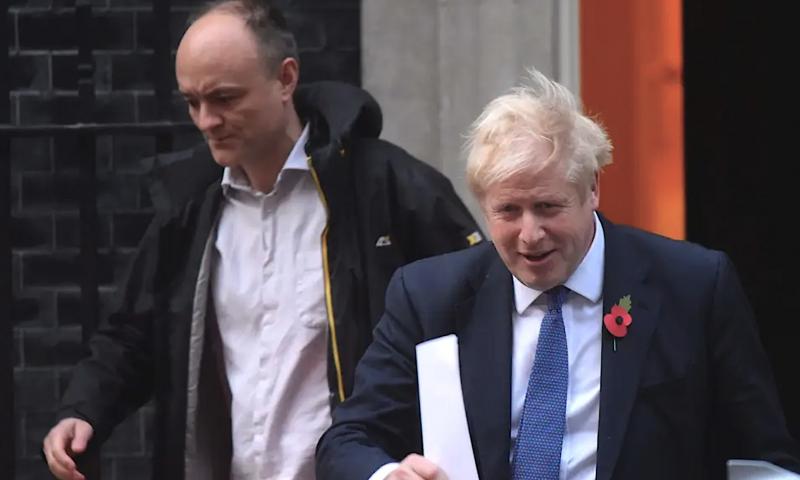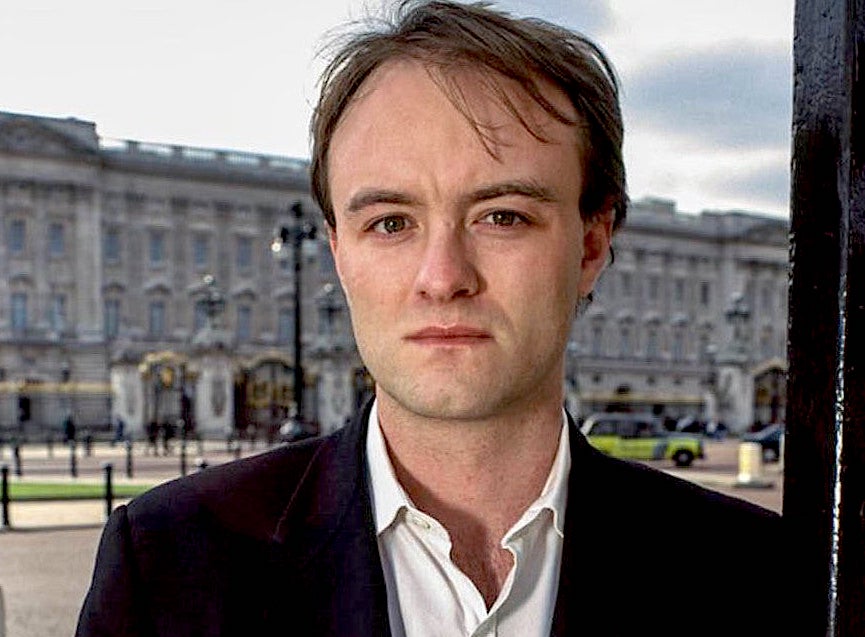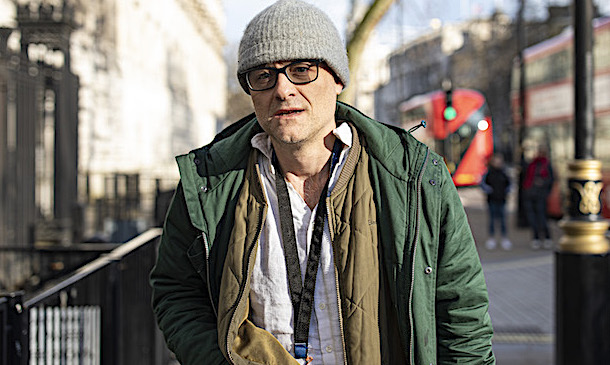Taking Control: The Dominic Cummings Story, BBC Two review - disruptive political maverick eludes pigeonholing | reviews, news & interviews
Taking Control: The Dominic Cummings Story, BBC Two review - disruptive political maverick eludes pigeonholing
Taking Control: The Dominic Cummings Story, BBC Two review - disruptive political maverick eludes pigeonholing
How Downing Street's secretive adviser set out to create a revolution in Westminster

This patchwork of interviews and comments from male journalists and politicians interspersed with clips from television news and films, from The Godfather to The Avengers, was a zig-zag narrative of Dominic Cummings’s unique career as a political strategist.
Presenter Emily Maitlis elicited a variety of comments: he is fearless in his views (but what are his views?), antagonistic to bureaucracy, a myth-maker, a shaker-upper (is this an occupation?), a Renaissance man, and of course a genius. In early footage of him sauntering outside Parliament he had disarmingly boyish good looks – it was startling to see this unassuming student type confidently telling us that the Conservative Party was hopeless, needed to get a grip on basic politics and that Iain Duncan Smith was part of the Grateful Dead – and he graduated to the balding scruff of today, whilst always remaining unpredictably and mysteriously compelling. He has more or less invented his peripatetic occupation, that of a freelance political adviser and strategist, from special adviser to Michael Gove and now chief adviser at No 10 (pictured below, the young Cummings).
 His EU battles brought Cummings to fame. He wanted to give Euroscepticism a radical new image beyond opposition to the euro. Peter Mandelson suggested the campaigns were careless with the truth, as Cummings suggested that the only thing less popular than the UK joining the euro was the Conservative Party. A confrontational campaigner, he displayed a sure touch in reframing issues and using provocative statistics to capture the public’s attention. Communications we were shown could easily morph into propaganda, while Colin Perry of the CBI told an attentive Maitlis of an unpleasantly aggressive physical encounter. There were anecdotal accounts of intimidation and bullying in Downing Street.
His EU battles brought Cummings to fame. He wanted to give Euroscepticism a radical new image beyond opposition to the euro. Peter Mandelson suggested the campaigns were careless with the truth, as Cummings suggested that the only thing less popular than the UK joining the euro was the Conservative Party. A confrontational campaigner, he displayed a sure touch in reframing issues and using provocative statistics to capture the public’s attention. Communications we were shown could easily morph into propaganda, while Colin Perry of the CBI told an attentive Maitlis of an unpleasantly aggressive physical encounter. There were anecdotal accounts of intimidation and bullying in Downing Street.
Cummings was described as inventing a kind of punk-rock activism, thought that the Conservative Party did not take well to realism, and worked to find a core belief in radical deregulation. He was director of the New Frontiers Foundation, which in 2004 called for “end of the BBC in its current form”; he was concerned too with the biggest tribal movements of people from East to West, which became readily apparent in the fears stoked about Turkey’s potential place in the EU; and while being in some measure part of the Establishment, he is cannily aware of the lack of awareness of the public on the part of politicians. He believes in the fewer politicians the better, and coined the phrase “politicians talk, we pay”.
We then moved on to the Michael Gove years at education, and learned that the Gove-Cummings duo kept a photograph of Malcolm X as an example of someone who believed history was transformed by conflict and not by incremental change. The running theme throughout was that Whitehall was dysfunctional and that bureaucracy did not work.
 He refused to appear before the Commons Select Committee to testify about fake news, seemingly continues to see Parliament as an impediment to the will of the people, and Brexit as the starting point for the reshaping of Britain.
He refused to appear before the Commons Select Committee to testify about fake news, seemingly continues to see Parliament as an impediment to the will of the people, and Brexit as the starting point for the reshaping of Britain.
What came across was the self-defined and original career of a high-functioning, incredibly bright maverick, but we were no closer to really understanding his beliefs, except in negative form. The rather melodramatic use of movie clips underlined that the narrative was really a fictional construct. Are we supposed to think of Cummings as Batman – or Robin? Or Dr Strangelove?
Capturing Cummings has certainly eluded the BBC. The wisest observation was that our politics are now in uncharted waters, and that for now at least Cummings is on board.
The future of Arts Journalism
You can stop theartsdesk.com closing!
We urgently need financing to survive. Our fundraising drive has thus far raised £49,000 but we need to reach £100,000 or we will be forced to close. Please contribute here: https://gofund.me/c3f6033d
And if you can forward this information to anyone who might assist, we’d be grateful.

Subscribe to theartsdesk.com
Thank you for continuing to read our work on theartsdesk.com. For unlimited access to every article in its entirety, including our archive of more than 15,000 pieces, we're asking for £5 per month or £40 per year. We feel it's a very good deal, and hope you do too.
To take a subscription now simply click here.
And if you're looking for that extra gift for a friend or family member, why not treat them to a theartsdesk.com gift subscription?
more TV
 Mr Scorsese, Apple TV review - perfectly pitched documentary series with fascinating insights
Rebecca Miller musters a stellar roster of articulate talking heads for this thorough portrait
Mr Scorsese, Apple TV review - perfectly pitched documentary series with fascinating insights
Rebecca Miller musters a stellar roster of articulate talking heads for this thorough portrait
 Down Cemetery Road, Apple TV review - wit, grit and a twisty plot, plus Emma Thompson on top form
Mick Herron's female private investigator gets a stellar adaptation
Down Cemetery Road, Apple TV review - wit, grit and a twisty plot, plus Emma Thompson on top form
Mick Herron's female private investigator gets a stellar adaptation
 theartsdesk Q&A: director Stefano Sollima on the relevance of true crime story 'The Monster of Florence'
The director of hit TV series 'Gomorrah' examines another dark dimension of Italian culture
theartsdesk Q&A: director Stefano Sollima on the relevance of true crime story 'The Monster of Florence'
The director of hit TV series 'Gomorrah' examines another dark dimension of Italian culture
 The Monster of Florence, Netflix review - dramatisation of notorious Italian serial killer mystery
Director Stefano Sollima's four-parter makes gruelling viewing
The Monster of Florence, Netflix review - dramatisation of notorious Italian serial killer mystery
Director Stefano Sollima's four-parter makes gruelling viewing
 The Diplomat, Season 3, Netflix review - Ambassador Kate Wyler becomes America's Second Lady
Soapy transatlantic political drama keeps the Special Relationship alive
The Diplomat, Season 3, Netflix review - Ambassador Kate Wyler becomes America's Second Lady
Soapy transatlantic political drama keeps the Special Relationship alive
 The Perfect Neighbor, Netflix review - Florida found-footage documentary is a harrowing watch
Sundance winner chronicles a death that should have been prevented
The Perfect Neighbor, Netflix review - Florida found-footage documentary is a harrowing watch
Sundance winner chronicles a death that should have been prevented
 Murder Before Evensong, Acorn TV review - death comes to the picturesque village of Champton
The Rev Richard Coles's sleuthing cleric hits the screen
Murder Before Evensong, Acorn TV review - death comes to the picturesque village of Champton
The Rev Richard Coles's sleuthing cleric hits the screen
 Black Rabbit, Netflix review - grime and punishment in New York City
Jude Law and Jason Bateman tread the thin line between love and hate
Black Rabbit, Netflix review - grime and punishment in New York City
Jude Law and Jason Bateman tread the thin line between love and hate
 The Hack, ITV review - plodding anatomy of twin UK scandals
Jack Thorne's skill can't disguise the bagginess of his double-headed material
The Hack, ITV review - plodding anatomy of twin UK scandals
Jack Thorne's skill can't disguise the bagginess of his double-headed material
 Slow Horses, Series 5, Apple TV+ review - terror, trauma and impeccable comic timing
Jackson Lamb's band of MI5 misfits continues to fascinate and amuse
Slow Horses, Series 5, Apple TV+ review - terror, trauma and impeccable comic timing
Jackson Lamb's band of MI5 misfits continues to fascinate and amuse
 Coldwater, ITV1 review - horror and black comedy in the Highlands
Superb cast lights up David Ireland's cunning thriller
Coldwater, ITV1 review - horror and black comedy in the Highlands
Superb cast lights up David Ireland's cunning thriller
 Blu-ray: The Sweeney - Series One
Influential and entertaining 1970s police drama, handsomely restored
Blu-ray: The Sweeney - Series One
Influential and entertaining 1970s police drama, handsomely restored

Add comment